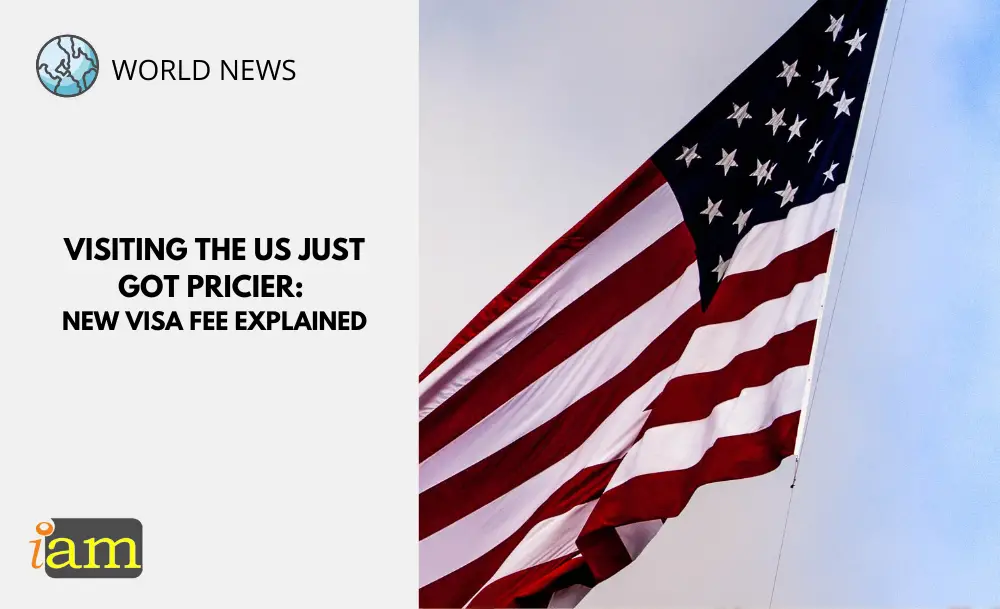Visiting the US Just Got Pricier: New Visa Fee Explained

A new travel fee is coming for most visitors to the United States — and it could raise costs significantly.
As part of a new law called the One Big Beautiful Bill Act, the US government will introduce a $250 “visa integrity fee” starting sometime in the 2025 fiscal year. While many details are still unclear, this mandatory fee will apply to nearly all non-US citizens who need a nonimmigrant visa to enter the country, including tourists, business visitors, and international students.
According to the Department of Homeland Security, the goal is to strengthen the integrity of the US visa system. While most travellers follow the rules of their visa, US officials say the new charge is meant to deter visa overstays, a major source of undocumented immigration.
An estimated 42% of the roughly 11 million undocumented people in the US originally arrived legally but overstayed their visas.
Who Has to Pay?
The new fee affects all applicants for nonimmigrant US visas — such as:
- B1/B2 visa holders (tourists and business travelers)
- F1 student visa applicants
- H-1B workers
- Any other travellers who require a visa to enter the US
Visitors from countries in the Visa Waiver Program will not be affected, since they don’t need a visa for short stays.
The visa integrity fee will start at $250, but the Department of Homeland Security may raise the amount and adjust it for inflation. It will be charged on top of existing visa fees, not in place of them.
Will the Fee Be Refundable?
The fee is technically refundable but only under strict conditions.
- You must comply fully with the terms of your visa.
- You must not overstay your visa by more than five days.
- You must not take unauthorized work or violate visa rules.
Refunds would only be issued after the visa expires, and it remains unclear how — or when — that process would work.
Due to the uncertainty, immigration lawyers are telling clients to assume the fee is nonrefundable and treat any possible refund as a bonus.
The fee hasn’t been implemented yet, and there is no official start date.
Government officials say it will require coordination across several federal agencies and possibly new regulations before collections can begin.
Impact on Travellers
This new charge could discourage tourists, business visitors, and students from choosing the US as a destination, especially with several large international events coming in 2026, including the US’s 250th anniversary celebration and the FIFA World Cup.
Adding to the concern, the US government has cut funding to Brand USA, the agency responsible for promoting travel to the country, making it harder to attract international visitors.
While the US government sees the visa integrity fee as a way to improve immigration compliance, travel experts and immigration lawyers warn that it could make visiting the US more expensive and complicated, especially for short-term visitors.
With the exact rollout still uncertain, travellers should stay informed and budget for additional costs of planning a US trip in the coming years.
What are your thoughts on this issue? Talk to us in the comment section below. Or if you need more advice on the above, contact us for further travel & immigration advice.
Check out the deals we have found below and tell us your travel plans.
Check out the offers and discounts from:
And because of the pandemic, don’t forget to get your travel insurance, which will cover you for flight disruptions and pandemic related matters.
IaM can help with your visa application to Europe, the United States, the UK & other countries
If you need help with a US visa, a UK Visa, or a visa to Europe, including help with appointment booking obligations, IaM can help. For more information and advice on US immigration, UK immigration law and US visa applications or if you need any help or assistance please, reach out to your Visa Coordinator at IaM.
Some of our posts include affiliate links. If you choose to purchase any of these products, we might get a small commission. For more information, check out our TOS.
- Simpler Travel in Sight: Europe Discusses New Tourist Visa - 20 July 2025
- EU Eases Schengen Visa Rules for Turkish Citizens - 19 July 2025
- Visiting the US Just Got Pricier: New Visa Fee Explained - 18 July 2025











